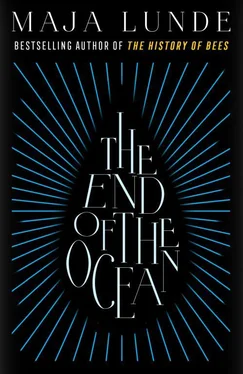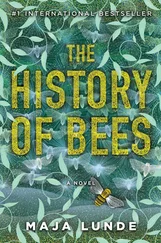A bistro by the wharf draws me in, no vegetarian dishes on the menu; I can’t bear the thought of fish—no mussels, nothing from the ocean right now—order boeuf bourguignon, can’t remember the last time I ate red meat, but I’m so thin, my body is all angles and hard edges. I’m hungry, I gulp down chunks of meat, carrots, mushrooms and onions in red wine sauce, a hot meal, a rich meal.
A glass of beer to drink, it goes straight to my head. I almost regret it—the world rocks even more and, strictly speaking, beer is not the right choice. The waiter makes this clear, wrinkling his nose when he puts it on the table—you should have ordered red wine here, of course, that’s what Magnus would have said, a full-bodied Bordeaux to go with the solid meat dish. But no wine for me; on the rare occasion when I do drink, it’s beer.
A man comes over, around my age, maybe a little younger, his skin tanned, a blue and white striped sweater, Top-Siders. A little pathetic, dressing like a sailor to signal his maritime connection to everyone.
“Can I sit down?” he asks in English, with a French accent.
“No.”
“ Please? ” he says.
“Why?” I ask.
“Have you sailed here from far away?”
It’s been a very long time, many years, since I last experienced this and it always made me angry, that a woman, the second sex, can’t sit alone at a restaurant, have a meal, without being disturbed, without a man storming over with a peculiar and vague agenda of protecting her from her own company, maybe also from other men, and hoping that this heroic deed will lead to further enjoyment in another, more intimate setting, preferably in a bed.
“I’m not looking for company,” I say.
“I didn’t mean to—”
“Yeah, you did.”
“Are you the one who came in with the Arietta?”
Is he really not going to give up?
I stare at him, evil eye , I think suddenly, and catch myself grinning, and the combination of a hard stare and a confusing smile is fortunately enough, because now he starts to walk away.
“Let me know, then,” he says. “If you change your mind. I’ll be over there.” He points at a bar stool.
I return to my beer, would like to drink it in peace, but am unable to think about anything but the man now. He’s sitting at the bar doing everything he can to avoid looking in my direction. He’s attractive, to the extent that men my age are attractive; perhaps he’s been at sea for a long time, sailing the kilos off him, slender, almost no paunch whatsoever, strong hands, thickly muscled and full of all the tiny cuts and injuries you get from sailing for weeks in a row, cuts that heal slowly when they are constantly exposed to salt water.
I could have gone with him to his boat. There’s nothing stopping me. Maybe it’s every bit as tidy and maritime as he is, dark blue with copper trim, weathered only in the right places. Or maybe it’s big, a forty-five-foot Hallberg-Rassy, a stylish cliché, white as chalk, except for a single, dark-blue, snobbish stripe, and with a bed twice as wide as my own, good mattresses, clean sheets, another body against my own, another’s warmth…
But no. Such an ordeal—the undressing, the bashfulness, the discomfort, embarrassment—maybe he has hair growth in the wrong places, I do at any rate, maybe he smells rank, alien, maybe he’ll think I’m too haggard, too wrinkled, at the end of the day, with all my scratches, scrapes and dents. And what about him, what about his scratches? No doubt he doesn’t give them a second thought, he’s a man, the positive and neutral being. The word for man in both French and English also signifies human beings in general, while I’m the negative, woman represents only the negative, defined by limiting criteria, without reciprocity.
I empty my glass, stand up, pay at the bar, stop for a moment. Shall I say something to the man at the bar, shall I give him a piece of my mind? No, I can’t be bothered, am too old for anger, too many have tried to rescue me.
Magnus also wanted to rescue me—he rescued me with a snowman, he rescued me at a party. It was maybe for that reason alone that we were together, because he continued to live off the good deed he had done when he was thirteen, when he had behaved like an adult. Maybe he had tried to live off that moment, tried to find it again and perhaps also tried to find his way back to the same helplessness in me.
Or was it me, was I the one who based our relationship on this, who was searching for the same thing again? I know that memories are unreliable, just as unstable as fiction. But whatever it was, it wasn’t enough to base a life on. He was an interruption only, an interruption in everything else that is really me. I have to trust it, because what can I trust if I start second-guessing my own history?
I unlock the boat and walk into the saloon, where the containers dominate the space completely. I want to sit down, but there’s no room, so I walk out into the cockpit again; it’s damp there, condensation on the benches, a cool evening, I miss the saloon.
I return below, pick up one of the ice containers. I can put them on deck; the mast has to come down tomorrow, to be disassembled for the trip up the canal. I can put them beside it. There aren’t any waves here, no storms to wash them overboard.
The feeling of plastic against my palms—I don’t dare open them, imagine if it has all melted, imagine if there’s no ice left… and have I started coming undone, imagine if I can’t do it, don’t have the strength, am too old, too slow, have lost the rage required to see this through?
No, no I haven’t, and it’s just as well if the ice has melted, then I can pour it out across his courtyard; it was supposed to melt anyway, sooner or later, the way all ice eventually melts and I can say that, I can shout that to him.
All ice melts.
Iwas awakened by the first rays of the sun. It had absorbed the moisture in me, even if it was only early morning. In my mouth, the taste of dust, a dryness so intense that my tongue was paralyzed. And the smell of fire. All of me stunk, like a piece of smoked meat.
I lay with my cheek against the ground. The soil shifted beneath me. I could see the stripes in the landscape that was as wrinkled as the skin of an old man.
The dry wisps of grass still held the soil in place, but they would soon surrender, crumble into dust. And what once had been topsoil, arable land, would be blown away.
I got to my feet. At the bottom of a bucket someone had tossed away I found a few dirty drops. Dirty water, shouldn’t drink dirty water.
But I couldn’t help myself and poured them down my throat.
Spittle formed in my mouth. And a taste, which either came from me or from the water. As foul as poison on the tongue.
I walked to the hall. Gathered our things, the few clothes, a little food I had saved. Quickly packed it up.
I moved as quietly as I could. Marguerite was sleeping heavily and soundlessly on my bed.
Every time I bent over the backpack, my head pounded, the nausea rose. But I did nothing to prevent it. I wanted to feel the nausea, the headache. I deserved it.
Then I pulled on my backpack and picked up Lou.
Finally I was the one carrying her.
Today I was carrying my daughter. I should have been the one carrying her yesterday.
And I should have been the one who carried my son, August. I should have carried him too. He was too heavy for Anna. She must have stumbled. He was too heavy.
No.
Just this, just now. Lou. My child in my arms. She was alive. She was here. I could carry her to the ends of the earth.
*
There was nobody sitting by the exit when we passed. I didn’t see the guards when I left what had once been a camp.
Читать дальше










